Opera and Classical MusicNotes
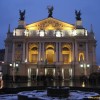
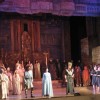


December 28, 2010
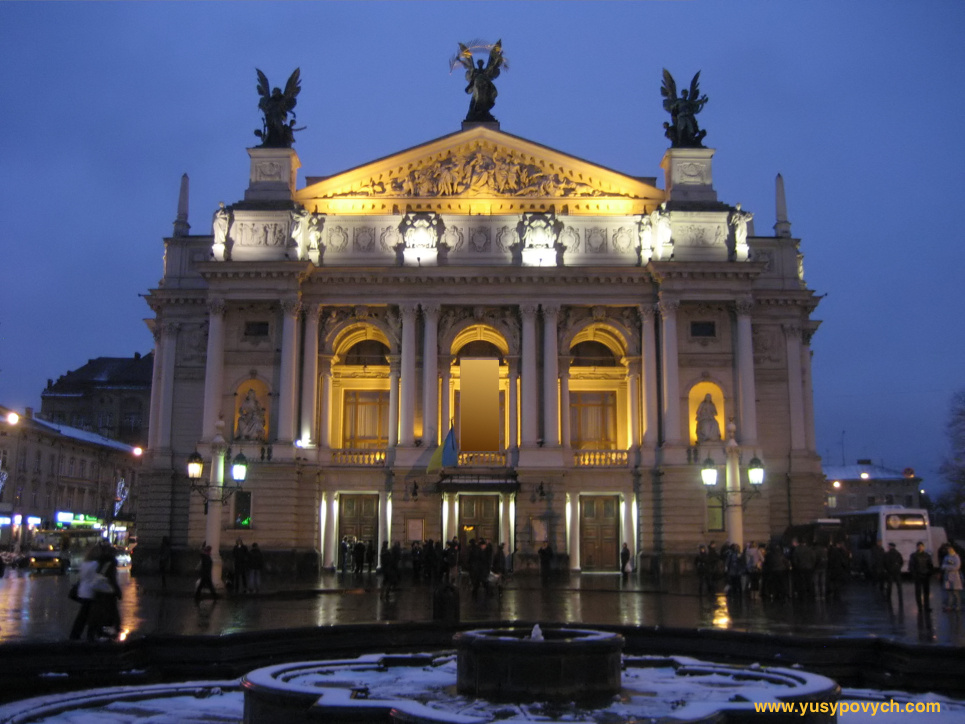
Lviv House of Opera
Today, the Lviv House of Opera is considered one of the most beautiful theatre buildings in Europe. And, notwithstanding all the economic and political crises, it is restored and renovated. Unrivalled by other attractions in the city, it remains a focal point for visitors to Lviv.
If we review the history of the Lviv House of Opera, we can differentiate two distinct periods in the theatre's development. Interestingly, they parallel the city's 20th century history.
During the past 110 years, the Lviv House of Opera went through a European period and then through a Soviet period. From 1900 to 1939, the city alternated between Austrian and Polish rule. From 1941 to 1944, during the war years, it was under German rule. From 1944 to 1991, the city and the theatre went unerwent their Soviet period.
In the first period, the European phase, the house of opera was known as the «Great Theatre». At that time, singers and conductors of world calibre were regularly engaged to perform at the theatre. Travel to Lviv from the many European capitals was not a problem. As a result, Ettore Bastianini, Modest Menzinsky, Salomea Kruszelnicka, Ruggero Leoncavallo, Gustav Mahler and many world famous singers and artists performed for the Lviv audience.
Then came the second period – the Soviet phase. Geographically, the City of Lviv found itself on the perifery of the USSR. Noone travelled to this area. And, no less tragic, and in particular when refering to the better soloists and conductors of that time, noone travelled beyond «the iron curtain».
I am deeply convinced that this was a great loss. It was a loss for those bright and sometimes unique artists, who couldn't get out. And, it was an unreparable loss for Europe and the entire musical world, who were unable to hear what this area had to offer.
On the part of Moscow, there was no interest in allowing the former «Great Theatre» to flourish. By political design, it was to become a provincial house of opera and ballet. Western Ukraine was politically a problematic region of the USSR and was to be relegated to provincialism. Even those famous opera singers from the West that were invited by Goskonzert and the Soviet Ministry of Culture, albeit infrequently, travelled no further than Moscow, and sometimes Leningrad. Lviv was not on the tour map.
In 1991, with Ukraine's Declaration of Independence and the changed political climate, everyone expected positive changes. At that time, Ukraine's population proclaimed its European allegiance and direction for development. In the case of the theatre and opera, this was indeed cause for optimism.
Unfortunately, it was not to be.
Every day, we hear declarations about the desire to become closer to Europe, to become a part of its life, its cultural traditions and cultural processes. For Lviv, this would be natural and possible. But its not that simple. The Soviet legacy has retained a firm grip on the city and country as a whole. And, the Lviv House of Opera remains an ideal mini-model of the State in which it functions and through which it is financed.
With the clink of celebratory champagne glasses, I want to say something pleasant. After all, I want to believe that the return of the Lviv House of Opera to the European fold will occur in the not too distant future.
And so, I toast without irony – «Forward to our European past!»
November 20, 2010

Marianna Humetska, Myron Yusypovych, Lidiya Futorska
To create music with first-rate musicians – creative individuals, is a great joy.
One of the responsibilities of a conductor is to lead the orchestra as it accompanies soloists. Or, so it is perceived in the «job description» of a conductor. Rarely, does it happen, and, rarely, have I had the opportunity to not simply be an accompanist, but to create great music – soloist, orchestra and conductor together, during a performance.
I can remember 2 vivid examples of such creation:
the Violin Concerto №1 by D. Shostakovich with the brilliant, young violinist Lidiya Futorska and the Lviv Philharmonic on March 19, 2006.
the Piano Concert in D Minor by W.A. Mozart with the incredibly fine and refined pianist Marianna Humetska and the Lviv Phiharmonic on February 9, 2007.
In both instances, the focus was not on the many technical details, issues and executions of the music. These were simply obvious.
Elegance, delicacy and intensity were the important categories for our focus. And indeed, in due course, these were critically acclaimed by our audiences.
With such musicians, conducting is easy and extremely gratifying. This feeling transmits itself to the orchestra and they, in turn, are inspired to rise to a different level of quality, beginning to sound differently.
The evening of November 20, 2010 was that rare opportunity when I had the joyous opportunity, once again, to create music with these magical ladies. And this time, no less, with both of them at the same time. It was our mutual appreciation of Joseph Haydn that brought us together. We performed the Concerto in F Major for Violin, Harpsichord and String Orchestra with the orchestra «Lviv Virtuosos» at the Lviv Philharmonia.
Performances like these inspire all of us: musicians to create, audiences to listen, everyone to enjoy. You just want to do it again and again trying and recapture that feeling. The question is: when will there be a next time?
November 15, 2010
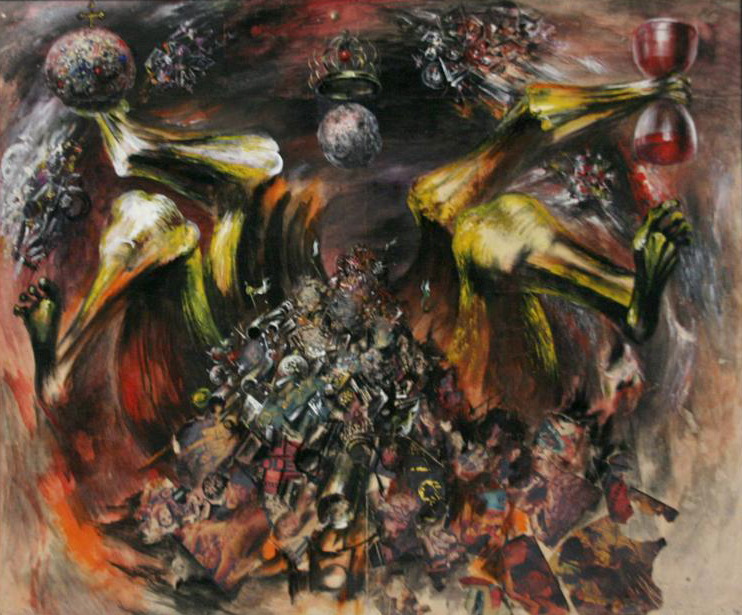
Scenic Design by Yevhen Lysyk
I remember when I first encountered the work of scenic designer Yevhen Lysyk. This was back when I had first started working at the Lviv Opera House.
On a subconscious level, I already knew then that his scenic design masterpieces on canvas were not simply the work of a stage designer engaged in the production of theatrical landscape murals.
His scope went beyond simply applying various artistic forms and mediums. He was constantly attempting to attain an overriding universal grandeur (dignity) by applying a wide scope of ideas and profound content. Equivocally, this master went beyond the confines of scenic design.
In all honesty, this, very often, became a problem for stage directors, production managers, stage performers and even music conductors. To attain the levels demanded by Lysyk, where there was no room for simplistic and common dalliances, was not possible by everyone.
For me, Lysyk's eternal themes and his ability to generalize them, while giving them depth and clarity, are akin to the best of great music. After all, Lysyk himself drew his ideas and inspiration from music. Richard Wagner and Yevhen Lysyk – I see them as kindred spirits.
This brings us to the fact that often the best canvases, as well as the best examples of world music, are spiritually inspired. In essence, they are born from the same seed – the soul, which gives birth and provides inspiration for both sound and colour.
Our Spheres of Harmony unite these so different and yet so similar forms. They have become the impetus for this simultaneous incarnation. I hope that for our audience this will become both an exquisite delight of listening and viewing pleasure. And for artists, my aim is to stimulate more of this great and unifying genre of art.
October 21, 2010
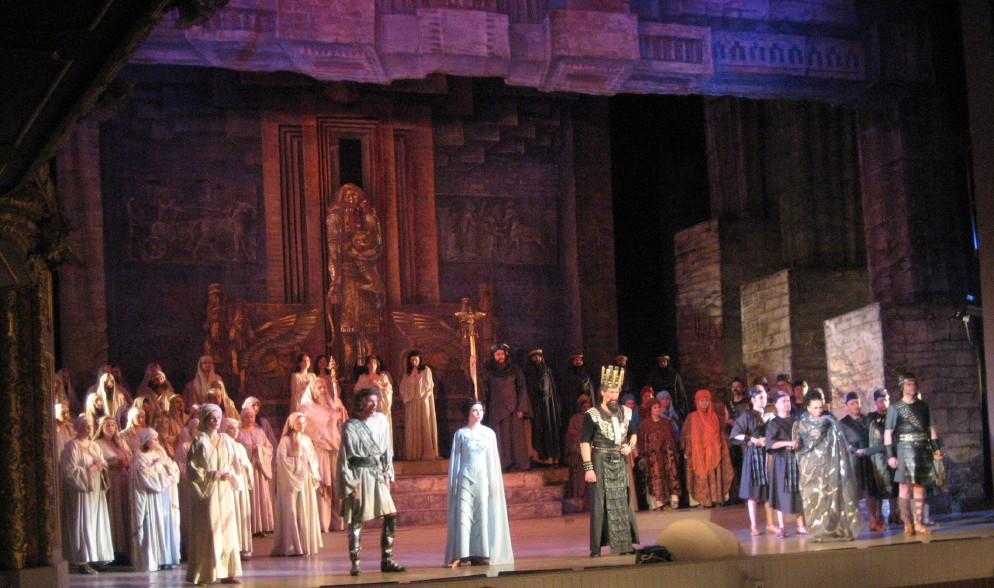
Verdi Opera Nabucco
The Verdi overture to Nabucco, as well as the opera itself, is perhaps one of the most frequently performed overtures, loved by both by audiences and performers alike.
From among all the Verdi overtures, the one to the opera Nabucco is a convenient and effective part of any opera gala concert.
I, personally, have conducted this music frequently. This is due to my engagement at the Lviv Opera House, which is a repertoire company. Up to now, I have conducted this overture 78 times as part of a full stage-performance of the opera Nabucco. Additionally, there have been many concerts. I have also recorded the Verdi overture to Nabucco at the Philharmonie München with the K&K Philharmoniker in 2004.
Such frequent performances of the same music, carries for the performer a certain risk. It is easy to lose the feeling of freshness. The only way not to fall into the trap of formality, while performing this «simple and pretty» Verdi is to:
*adhere strictly to the composer's requests, as written in the score
*to force onesself and the musicians to honestly and thoroughly examine the well known pages of notes, as if for the first time.
Only then, will this music not become sweetly-trite, but will maintain its clean beauty and Verdi grandeur.
I get extremely annoyed by conductors, who arbitrarily apply retardations in the overture to Nabucco. It doesn't matter whether they do it for lack of taste or with the aim of easing their conductor's job during the performance.
Under their guidance, the Verdi overture to Nabucco becomes a simple composition of sweet Italian melodies compiled by the composer on the eve of the opera's premiere. Indeed, this may be a historical fact. However, this is no reason to approach this music simplistically and to perform it primitively.
Some of the so-called traditions of performance and interpretation widely accepted today are in actuality a departure from what the composer originally envisioned. Playing the notes formally and duly is not performing Verdi's music. Ironically, a return to Verdi's score, in all its initial vision and excellence, is nothing short of innovative.
G. Verdi is a composer who needs to be approached with great precision. And a performer's hundredth «meeting», must be viewed as a first.
October 6, 2010
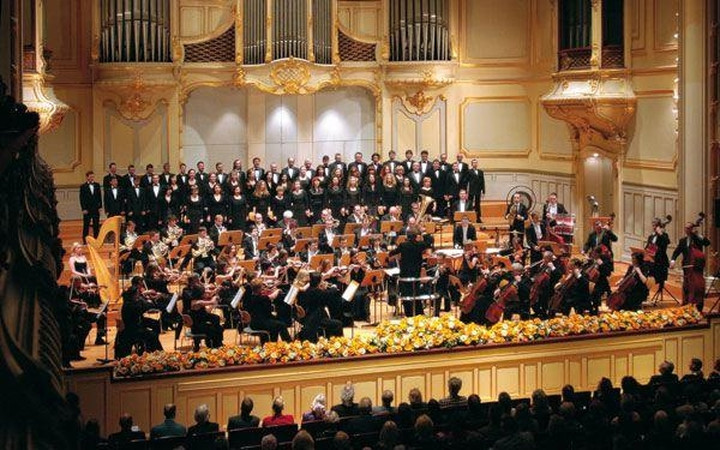
Verdi Overtures Conducted by Myron Yusypovych
Verdi overtures, or more precisely – Sinfonia, belong to that category of music which is well known to a wide audience. In particular, this is true of the Verdi overture to La Forza del destino. Recently, through the advertising efforts of the beer company “Stella Artois”, this overture’s famous motif has even become a popular hit.
A music critic, writing about my performance at the Konzerthaus, Berlin, called this lovely overture by G. Verdi “a must have”, meaning that a “Verdi Gala” or an “Opera Gala” almost inevitably includes this Verdi opera overture.
All in all, it would seem difficult to amaze and astound an audience with a performance of this popular Verdi music. So, it was all the more pleasant to read in the press that this “must have” was performed by a “true Verdi specialist, who avoids all routines and simplifications” (Mannheimer Morgen).
Obviously, this is extremely pleasant. Even more pleasant is the feeling of appreciation expressed through the audience’s enthusiastic response.
And still, I have often wondered – what is it that distinguishes the successful performance of Verdi music from a routine one?
It turns out, the answer is quite simple. Verdi melodies are beautiful. But Verdi’s true genius lies in his knowledge of musical dramatics (dramma per musica). It is only when this is actually recreated that this composer becomes not just pleasant, sentimental, trite and sweet, but grand, monumental and… pristine.
It may appear strange, but often orchestras, or more precisely conductors, (and not just those working in some outlying cultural regions of the world but even those considered “great conductors”) are unable to attain this. In this particular case, the G. Verdi overture can become a medley of sweet melodies, effectively complemented by the dutiful ff (very loudly) and pp (very softly) and… completely arbitrary tempi. This arbitrariness kills Verdi the musical dramatist. For it is precisely here, that Verdi attains highest merit and attraction.
Recently, I set myself the somewhat benign task of listening to some 10 or so performances of the Verdi overture to La Forza del destino and the Verdi overture to Nabucco posted on YouTube. Someone said that YouTube is nothing but a garage can. There is some truth to this. But, garbage is an irrevocable part of our lives and some garbage, as we can see, might even be valuable.
Among the ones I chose were the “greats”: the Metropolitan Opera, the Mariinsky Theatre, the Staatsoper Wien, as well as lesser known performers.
The result? In only 3 instances did the conductors (and orchestras) recreate the tempi, that G. Verdi indicates in his score. As a result, only in these 3 performances was the true Verdi evident. Not a sweet and simplistically showy Verdi, but monumental, passionate and true.
Bravo Mitropoulos, Toscanini and Mutti! In these performances, these gentlemen showed respect for the true Verdi and not self adulation at the cost of Verdi.
In all the other instances, including incidentally the Met and Mariinsky performances, the self serving slowdowns, irrationally glittering quickened episodes, after which the final “piu mosso” in the overture to La Forza del destino is not even performed, are one big lie wrapped, albeit, in enticing and bright packaging. It is no longer relevant whether the conductor has a baton in his hands or a toothpick in his two fingers. What are they thinking? That this “humdrum Verdi” deserve no better?
But what is pleasant is that even on YouTube, if we read the comments, some people are able to distinguish the good and the ugly. Bravo!
September 16, 2010
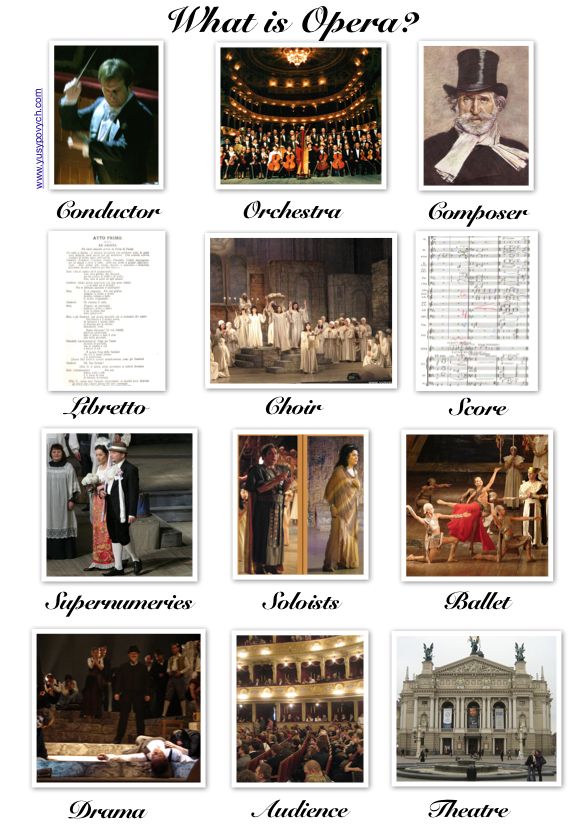
Opera Definition
Since an academic definition of “opera” can be found in any encyclopedia or dictionary, I would like to comment not on the formal characteristics of this genre or its historical development, but on what can be labeled as the “opera phenomenon”. By this, I mean the unique emotional state experienced by audiences of this genre, which has allowed opera to remain in the forefront of human culture for more than four centuries.
In the Holy Scriptures is is said that: “in the beginning was the Word”. And so it is with opera, where it is “the word”, which carries the meaningful information, develops the story line and creates the necessary dramatic intrigue. But, opera audiences, participating in an opera experience, want, nay, need to engage with more that just “the word”.
“The word” in opera can describe the situation and provoke certain emotional states in the listener. But, “the word” by itself is incapable of elevating the audience to a level of emotional euphoria. It is only when “the rational words” are supported by the full spectre of sounds that the listener is transposed into a completely different state of emotional heights than that, which can be provided by “the word” alone. And, it is this that the audience subconsciously awaits and yearns for in an opera.
Music ensure that the emotions evoked by words can be developed, deepened and, what is most important for humans, given the opportunity to be sustained in this state, over a certain period of time.
“Rational words” lay the foundation for the melodies, harmonies, vocal and instrumental colours, rhythm, tempi, that develop and guide us, the listener to the highest of expressions and emotional states. For the most part, the audience participates in what is going on, on stage not through “the word”, which is sung on stage, but through the emotions evoked by the music. In themselves, the words become secondary.
In classical opera, a full aria may sound from 3 to 6 minutes. And yet, this same aria might consist of one or two sentences, which allows for only the core ideas of content to be transmitted. All else that is born via this content is portrayed and expressly developed through the music leading to what is most important and worthy – the emotional state.
For example, in G. Rossini’s The Barber of Seville, Rosina’s aria “Una voce poco fa” has few words. But, the joy, delight and happy anticipation of a girl in love are clearly communicated through the bright coloratura passages. And they are performed using just a few select words.
In opera “the rational word” is the seed planted to introduce the emotional state. The development of this emotional state, the pleasure of remaining in this state and the ability to relish this process of ever escalating musical drama is this phenomenon of opera that is particularly enticing and unique.
But, and this is indeed a big “but”, there is one very important nuance. For the opera phenomenon to occur, it is imperative that brilliant, or at least highly professional performances of opera be staged. Otherwise, opera becomes something that is difficult to understand and frequently, just plain ugly. In a poor production, the “opera phenomenon”, which is the quintessence of the genre, just won’t happen.
Two extremes reign in this genre: brilliance and misery. A third, middle ground just doesn’t exist.
Continue reading: What is The Opera?
June 5, 2010
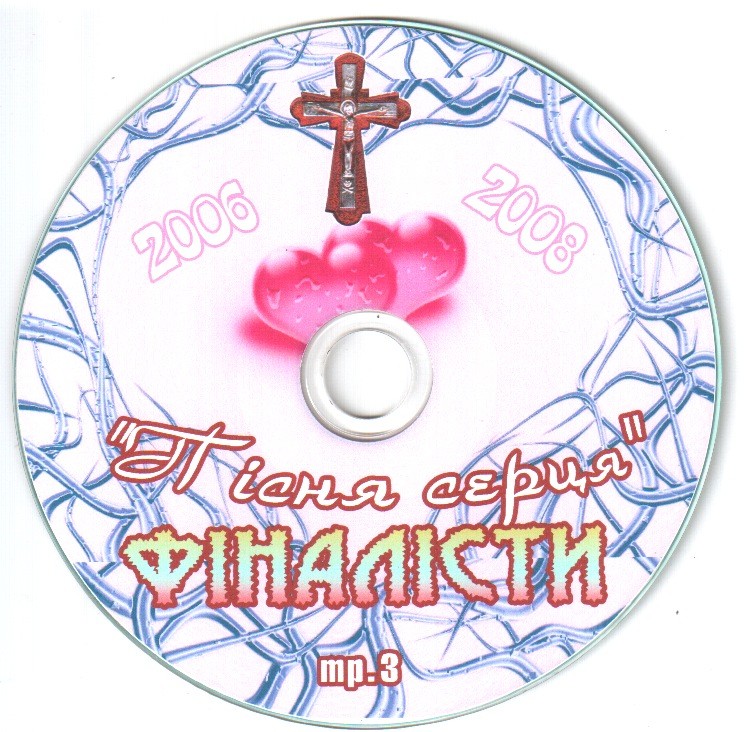
Song Heart
In Ukraine, we live in a society of economic difficulties, political crises, persistent redistributions of power among governing elites and the day-to-day difficulties that these entail.
Nonetheless, this past weekend, I was in the company of a small group of people, who continue to actively persue what, for them, is a sacred and strategically priceless mission – the care, development and education of our children. They do this actively, while rejecting long-winded directives, reports and speeches filled with pathos and empty promises. I wish to express my enthusiasm for these people, a great thank-you to them and my deepest regards.
As head of the Judging Committee of a Children's Singing Competition «Song Heart 2010» , I reaffirmed for myself, once again, how many truly talented children we have and how they challenge us – adults and our ability to possess common decency.
Why do I focus on «common decency» in adults?
First, a small digression. Obviously, for me as a professional, it would probably be quite appropriate and easy to just say a few words about the children's beautiful voices, their artistic stage flair, the quality or lack of sound tracks, the live accompaniment, the organizational aspects of the competition.
But, because I am commenting on a children's competition, I feel a need to consider, what to me is a more vital aspect. Undoubtedly, I am influenced by my recent experiences in another more prestigious, international adult opera competition that took place in Lviv. As a result, I am drawn to draw parallels between the concept of «competition» as a whole and the moral and ethical atmosphere in a country or state.
So, what is a competition – any competition?
I remember someone once saying, that it is the luck of the draw – you win some, you lose some. I reject such a view since it, right from the start, presupposes dishonesty and justifies an individual, who is involved in the process for the sole purpose of clandestine, personal gain.
Unfortunately, unfair competition, to a greater or lesser degree, is evident all around the world. And yet, in democratic countries, where rules and laws are meant to protect human dignity, blatant abuses are less frequent. In a society, where corruption has become a way of life, it may be difficult, even a waste of time, to expect competition results, that will honestly reflect the real level of quality.
In a corrupt society, the local contest to choose a regional «Miss Something», or an international competition of opera singers, or an audition to fill a job vacancy – become competitions of protectionism, connections and bank accounts. If you don't bribe, don't use your connections, don't ignore the screaming voice of your conscience – you are left with nothing. The result – a slow rotting of the spirit and massive despair.
Someone buys a «Miss» title for a million, someone else, for several thousand. For a buck, someone gets a reference from the local authorities, someone else, from the doctor's office. Why? Perhaps, because everyone in this sick society appears to have something to gain. It's only a matter of degree.
For, it is neither outdated factories and mines, nor the impact of political infighting, nor an outside enemy's hand threatening us that is keeping us in the mire. Our biggest problem, at all levels of society, is the tragic poisoning of our hearts.
For someone on the outside looking in, it may seem strange and incomprehensible, that everyone in this society sees, understands, discusses and complains about this depravity, but lacks the will to get rid of it. Unfortunately, such are the realities of our country today. People in Ukraine have lost all faith and hope that a different way of life is even possible.
To regain our well-being, we must begin to build on a healthier foundation. Starting with a nationally recognized artist, who heads an international opera competition, to the professor, who is a member of the entrance committee at a musical academy, all the way to the local clerk, who provides community services – all must begin to cleanse this poison. The higher the rank – the greater the duty and responsibility.
For many, our internal belief in the greater good is the first place, where we rebuild our faith. And for some of us, the Church provides the needed spiritual support in this complicated process.
I return to the competition this past weekend, which was initiated by the Ukrainian Catholic Church. Put simply, it was a beacon of hope.
«Johnny» sang in his clear silvertoned voice and we heard it for what it truly was, ignoring the fact that he came to the competition using public transport and not being chauffeured in a fancy car. There's no doubt that he and others like him will experience unfair play many times. But, nevertheless, this day he believed that things are possible. He felt strong and, hopefully, will have the will to work and fight. For, he achieved, based on true merits.
Those of us, who have been given the power or opportunity to influence events must finally learn, that there are few joys greater than not giving in to promises of gain, burdens of friendship, illusions of grandeur and doing what we inherently know is right. And, when we follow our inner voices and do good, we experience feelings of empowerment.
April 29, 2010
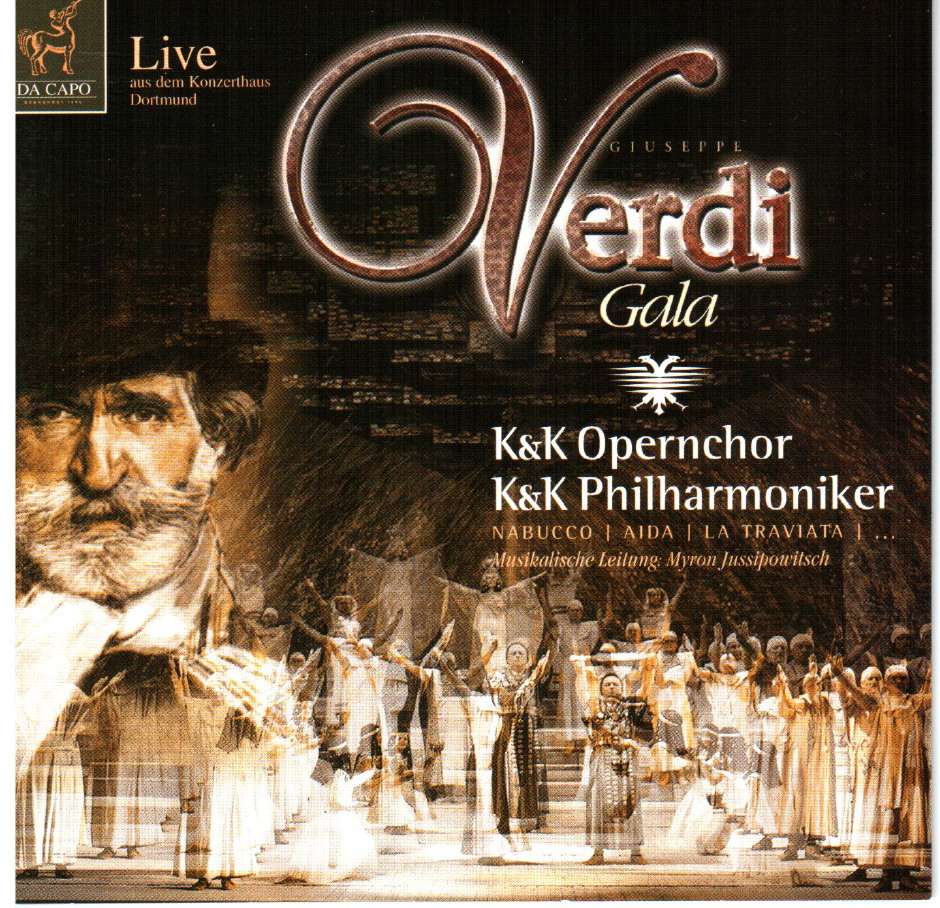
Operas Verdi Gala
The recent, unexpected problems at the Metropolitan Opera in New York and the opera La traviata by G.Verdi are not, to my mind, that unusual. Perhaps, it is a good idea to examine this situation keeping in mind the so called “phenomenon of simplicity” of Giuseppe Verdi’s opera music. On the other hand, this relates not just to Verdi and his operas, but also, to the music of other brilliant composers.
In terms of the actual arm gestures, neither La traviata, nor any other opera by G. Verdi, including Aida, Otello or Falstaff, compare with the demands of Histoire du soldat (The Soldier’s Tale) or The Rite of Spring by Igor Stravinsky. So, what, then, is the problem?
I have had the experience of conducting music, where the composer has felt a need to employ (probably because he felt he couldn't do otherwise) every type of beat possible: from 1/8 to 12/8. Additionally, these would change every few bars and in quick succession. I am not a proponent of someone’s expression, that sometimes, after leafing through a music score “you just want to get up and wash your hands of it”. I feel that, if the score has 2 timpani, 1 set of cymbals, a large drum and another 20 or so percussion instruments, then there must be someone, who wanted to say something with this.
I admit, as a young 20 – 30 year old conductor, this was interesting and actually more exciting than conducting operas of Verdi. At the time, for me there was no need to search for any other form of extreme activity to raise my levels of adrenaline. Truthfully, however, the orchestra members didn't always share my enthusiasm.
Nevertheless, the quantity of energy expended by the conductor and musicians in order to perform an overly saturated and complex musical score is not the issue. The important issue is the artistic outcome and the effect it has on the audience. It is the audience that has to become convinced. The audience is neither interested in the number of rehearsals, nor the number of instruments in the orchestra, nor the rhythmic and intonational complexity of the pieces, nor how much the conductor perspires. They don't need an explanation of the technical means. What they need and want is the aesthetic result – the feeling. People come to a concert hall or opera theatre searching for this artistic feeling. And, they do this not only with operas by Verdi.
The irony is, that it is precisely these «means», that sometimes become convenient alibis for conductors and musicians. When a performer doesn't comprehend subtlety and simplicity for its genius, then he is incapable of expressing its artistic form. It is possible to hide behind the many technical difficulties, with which «complex» non-verdi musical scores are stuffed, much like an over-run forest. The process of overcoming these difficulties by the conductor borders on the heroic. In actuality, it becomes a substitute for a higher and worthier artistic process. And, then we are dealing with a dry and empty craft. It might be of high quality but, audiences don't come to hear good craftsmanship.
I prefer to walk in a clean, well-kept sunny forest. It is true, that it is much more difficult to hide there. And so it is with Verdi's simple «um-pah-pah», which accompanies «Addio, del passato bei sogni ridenti» by the dying Violetta, in Act III of G. Verdi's opera La traviata.
If the conductor's podium is held by an artist, the result is moving, sensitive and subtle. But, if there is a craftsman, then we experience something simplistic, empty and boring. It is impossible to hide behind the «um-pah-pah» of G. Verdi operas.
And this, to my mind, is the essence of the problem.
April 17, 2010
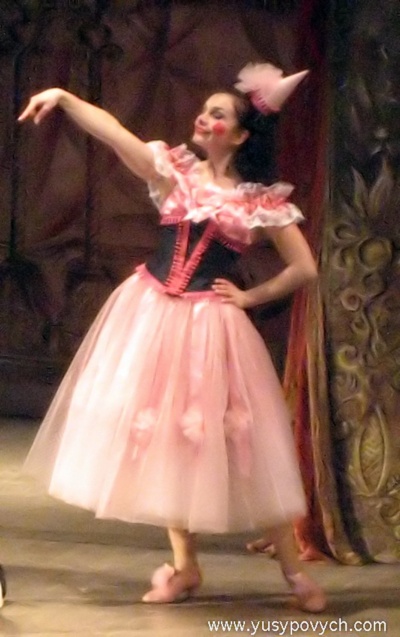
Nedda in Pagliacci
The opera Pagliacci by Ruggero Leoncavallo belongs to those operas, where the age of the soloists performing the main character roles is extremely important.
If we don't have a real soprano to sing the role of Aida, we can't stage Aida by G. Verdi. The soprano, who sings Aida must have mastered the appropriate voice capabilities and be fully competent. Thus, it is not that important if the Ethiopian princess is not quite young and doesn't stand to compete with the young girls on Fashion TV. Aida and her delicately erotic triplets during her night scene with Radames, on the banks of the Nile, in Act III of the opera, will outshine any absence of long legs or other physical attributes.
However, it is a completely different situation with Nedda, the operatic heroine in R. Leoncavallo's Pagliacci. In this case, it is imperative that there be a young «wench» on stage. An audience will not be satisfied with just a beautiful voice and clear singing. Nedda in R. Leoncavallo's Pagliacci must be nimble, slender and young. We can, if necessary, compromise on this account with the other characters in Pagliacci - Canio, Tonio, Beppe. And yet, if Nedda, the enamoured damsel and Silvio, her lover, don't look the parts, no one will really believe the torment and agony of the dramatic tenor – Canio. In this case, the «vero» must be available both for the audience's ears and for the eyes.
It was a pleasure to work with such a Nedda, Veronika Kolomishcheva, at the April 17, 2010 performance of Ruggero Leoncavallo's Pagliacci at the Lviv Opera Theatre.
March 19, 2010
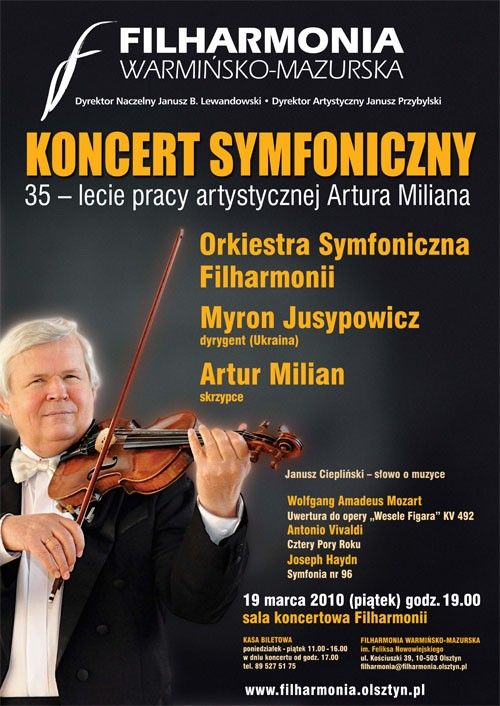
Symphony Music Concert in Olsztyn, Poland
It was an immense pleasure to perform the Joseph Haydn Symphony № 96 with the Warminsko-Mazurska Philharmonic Orchestra in Olsztyn, Poland on March 19, 2010. I enjoyed working with the orchestra and I was delighted by the reaction of the evening's audience.
Following the performance, my thoughts once again turned to the idea, how inherently natural and, perhaps, even essential it is for human beings to sense from time to time harmony in form and sound that is clear, logical and predictable on the subconscious level. Humans strive to attain this balance within the soul. When, the listener doesn't have to «labour», because this consonance is organized into harmonically polished forms, one's soul and mind naturally flow as one.
It is an immense joy, to leaf through the score of this great «gourmet» and enjoy his creativity, humour and ability to gauge abundance and graceful taste. This is Joseph Haydn music and all of it, without a single «fff» or «ffffff» and with a brilliantly «simple» orchestra.
I suspect that, the desire to constantly increase the acute dose of brute emotional force is just part of our human nature. As a result, we have arrived at humungous decibel levels, as well as, gigantic and not always harmonic forms. We have travelled from slow moving carriages to superfast aerobuses. And, somewhat on a less positive note, we have evolved from the cannonball to the hydrogen bomb… And still, something is missing.
And, then quite suddenly, because of a happy coincidence (after all, the score for Haydn's Symphony №96 came into my hands quite unexpectedly) one comes to the conclusion that this is what we really need – a mere 23 minutes of symphonic music by the timeless Joseph Haydn.
How I want to share this incredible discovery with someone!
Continue reading: Myron Jusypowicz Performs Opera and Classical Music in Poland
February 14, 2010
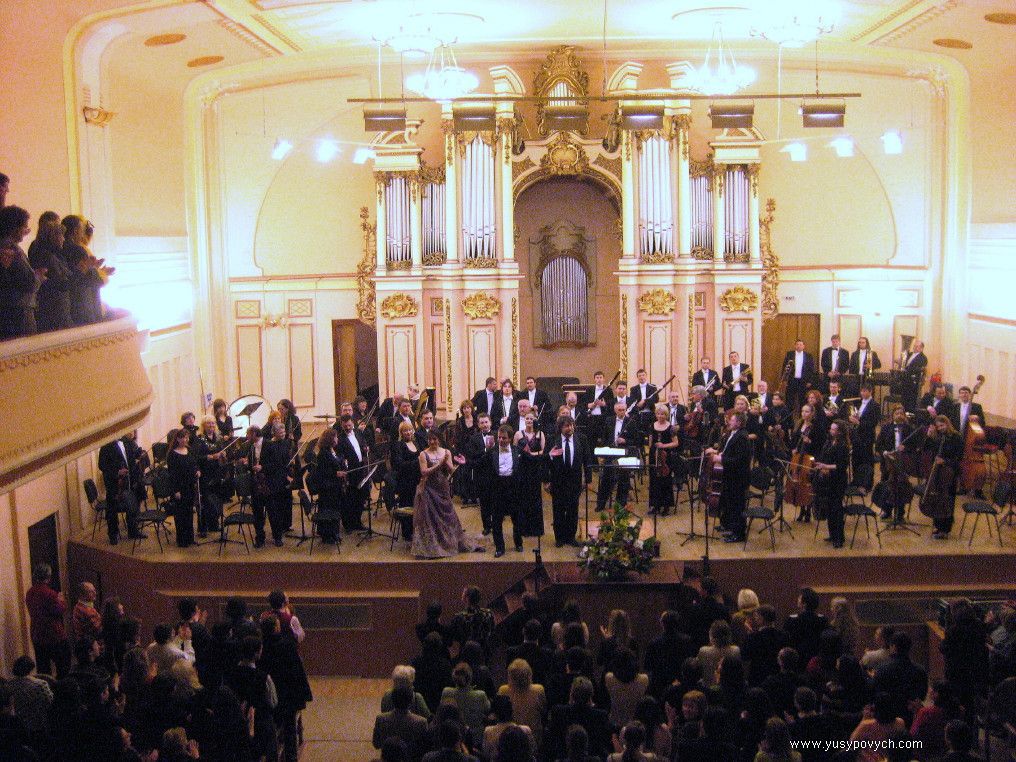
Greatest Opera Love Songs in Concert
Opera love arias, opera love duets, Neapolitan songs and Ukrainian love songs – all of this served to entice the people of Lviv to the Lviv State Philharmonic, on February 14, 2010.
I've dreamed of organizing a special Gala Concert on St.Valentine's Day for a long time. There are many reasons why I've wanted to do this. Incidentally, the fact that the sacred relics of the great martyr are kept in the Catholic Church in Sambir, Ukraine (built in 1502) – the city of my childhood and a good part of my youth, had something to do with it
Anyone who enjoys opera or ballet is aware that «The Sounds of Love» transcend all examples of this genre. So, it would have been easy to simply choose from a list of the top opera love arias and love duets, Neapolitan songs and popular Ukrainian songs about love, which are always in demand by an audience. But, in all honesty, I didn't want to take this easier and somewhat humdrum route.
I decided to take a risk and offer such relatively unknown pieces as the instrumental piece «Death of Isolde» by Richard Wagner, Valse Fantasie ( Waltz Fantasy ) by Mikhail Glinka, an instrumental fragment from Act 3 of G. Puccini's Madama Butterfly and the passionate Adagio from the ballet Spartacus (Spartak) by A. Khachaturian. All of this was «spiced up» with readings of poetic texts from my personal anthology of poems (see October 9, 2009).
And there you have it! The results surpassed my expectations. To my great satisfaction, the dying Isolda got the same turbulent applause, as the well known aria by Calaf, with its brilliant «Vincero!», from Turandot by G. Puccini. An even greater surprise was the fact that the hall was filled to capacity. That evening there was even a record box-office intake! It exceeded seven fold the amount of tickets usually sold at the Lviv Philharmonic.
Lviv has an audience! And what is most important, is that this audience is not made up of just older people, but includes many young people. That evening, these18 to 35 year olds made up 75% of the audience! What is the secret of such success? I would suggest that this highly astute audience, not contaminated yet by snobism and falseness, requires what I would call a «real» performance. My experience has shown that they instinctively reject a mediocre product, that is masked under the guise of elite art, false regalia and empty snobbism. These young people need an authentic and quality product.
February 12, 2010
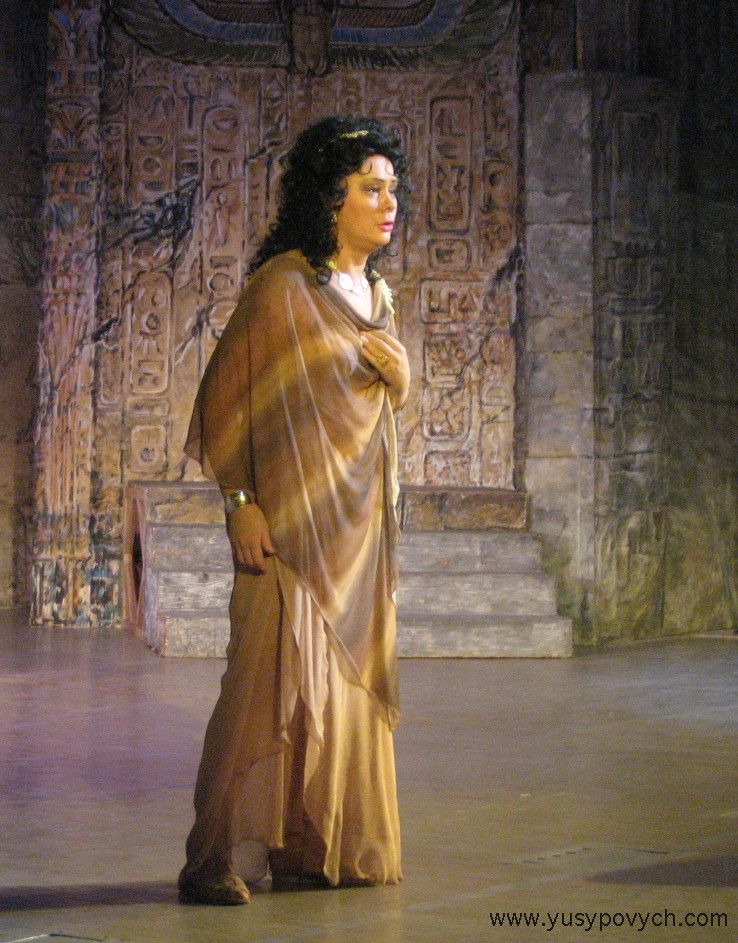
G.Verdi’s Aida at the Lviv Opera
Everytime, I conduct G. Verdi’s Aida, just before the beginning of Act III I become extremely apprehensive. It is in this part that Aida sings her incredible aria (“Qui Radames verra!...”).
In Act I and Act II of the opera Aida we can engage the audience with a brilliant orchestra, grandiose choral scenes, splendid dances and lush decorations. If finanical and stage resources permit, it is even possible to bring out the horses, camels and elephants.
And then – Act III.
The stage is in semi-darkness. Somewhere, off stage, in the distance, on the other side of the River Nile, the choir sings. On stage, we have 1 or 2, at most 3 soloists, who must keep and even increase the momentum attained in the first 2 Acts of the opera. Not a simple assignment!
And, this is particularly true of the soprano. Aida’s aria (Romanza – Aida) at the beginning of Act III is probably the most difficult and yet, at the same time, perhaps the most beautiful of all Verdi opera arias for soprano. Most of it is performed quietly (p) or very quietly (pp), and yet this aria has an especially colourful orchestral part and is highly dramatic.
Overall, the music is fine and sensual, while the vocal part demands a great mastery of voice, refined taste and immense dramatic talent.
The music is incredibly harmonic and accompanies a highly expressive and poetic text (“O cieli azzurri, o dolci aure native…” - . “O blue skies, o tender native breezes…”). This is also true further on in the duet between Aida and Radames (“In estasi beate…” – “Blessed in ecstasy...”). The delicate aroma of this scene effectively contrasts with the brilliance and pomp of the finale in Act II.
It is cruelly ironic, that the brilliance and great triumph “achieved” in Act I and Act II can be smashed, destroyed and devalued in Act III, if there isn’t a genuine soprano to sing the role of Aida.
This is the unmerciful reality of this brilliant opera. For an engaged audience, however, this is the spice that adds interest and excitement to this Verdi opera.
We can perform Aida without horses and elephants – but, never without a first-rate soprano!
January 24, 2010
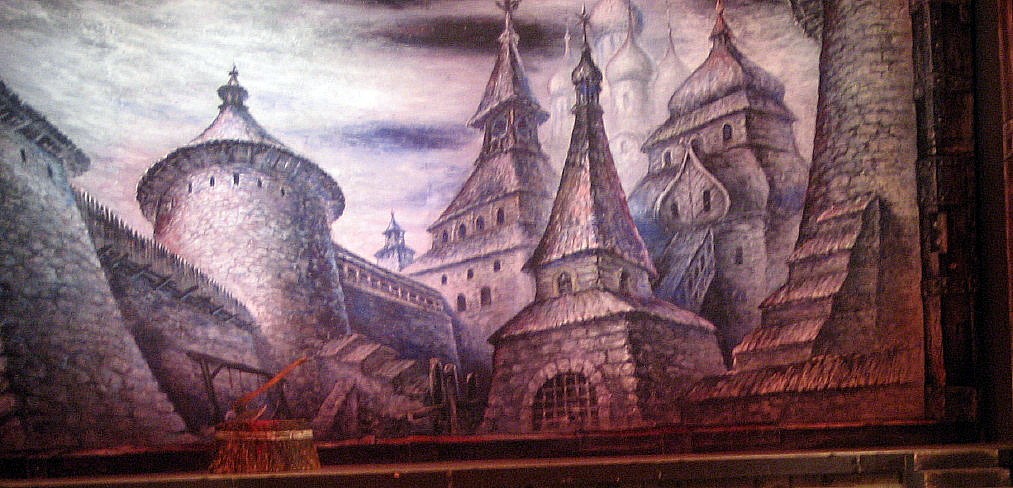
A Russian Opera Scene
Very few Russian operas are performed on a semi regular basis in Western opera halls and theatres.
Why is it that even though there are about 100 Russian operas, only a few of them have gained popularity in the West?
I know the Russian opera repertoire well. As a result, I would claim that the reason has nothing to do with the quality of these operas. On the contrary, several of these operas are genuine masterpieces and according to some parameters, supercede the quality of that which is more popular. So, it is truly unfortunate that the world doesn’t know and doesn’t listen to Russian opera more.
To my mind, the real reason why Western audiences don’t get to see and hear more Russian operas is because of a particular phenomenon, which can only be labelled as “Russianism”. These operas ae filled with this unique approach to emotions and a particular way of thinking, which is not that well understood in the West.
It may appear that Western Europeans are not interested in such names as Snegurochka (The Snow Maiden) or The Tsar’s Bride by N. Rimsky-Korsakov. They also tend to be blas? when it comes to Iolanta, The Enchantress (sometimes translated as The Sorceress, original transliteration Charodejka) or even Mazepa by P.I. Tchaikovsky. Kniaz Igor ( Prince Igor ) by A.P. Borodin is also unpopular.
Although these Russian operas tend to be suppressed in the West, they have just as many expressive solo melodies, lush choral episodes, sharp drama and exquisite orchestral scores as any other operas that have gained wide popularity.
Greater attention tends to be given to a select few, from the Russian opera repertoire, for example:
- Eugene Onegin or The Queen of Spades by P.I. Tchaikovsky;
- Boris Godunov and Khovanshchina by Modest Mussorgsky.
I ask myself – why?
For some reason audiences appear to be less interested in the polished melodic arias from Ivan Susanin (also known as A Life for the Tsar) by Mihail Glinka. Nikolai Rimsky-Kosakov was one of the top composers for the orchestra and is well known for his extremely rich and colourful orchestra scores. And yet, his Snegurochka and The Tsar’s Bride don’t seem to appeal.
Maybe, the Western listener wants, nay needs, to find in a Russian opera, as in Russian music in general, something uniquely Russian, something, which is unavailable in the comfortable and aesthetic judiciousness.
If, we want to taste delicious and pleasant melodies, then we can experience harmony while attending performances of Verdi, Donizetti or Bellini. A Rossini performance will ensure a good mood and coloratura brilliance. The genius of Mozart promises an all encompasing experience. A Wagner opera will provide the impact of unearthly grandeur and the clear silver of the high violins.
What then can the European seek here, in the few Russian operas that are made available?
Russian opera is unified by a particular emotional and psychological tone and. It is a heavy temperament that is depressing, but strangely, enticing.
It is this, which is typically Russian. It is inherent in the people from that part of the world. Interestingly, it is this which even Russians themselves are unable ultimately to explain: “You have to feel it.” (Eto nado pochustvovat) is the popular explanation.
At one time, I lived in Leningrad (currently St. Petersburg), where I conducted in the Kirov Theater as it was called then (now the Mariinsky Theatre). For ever after, I will remember the heavy, “leaden”, cold sky and morose faces. Even then, somehow on a subconscious level, I understood my local acquaintance and friend, who from time to time, would call me and suggest that we meet, take a bottle of vodka, drink it (almost without anything to eat), listen toTchaikovsky’s Symphony № 6 and “cry”. I didn't understand the need to cry? The explanation given was «because of longing».
This feeling of longing is what ultimately is incomprehensible. For, it is not necessarily tied to the life’s circumstances or specific problems of everyday life.
This longing becomes a need. As a need, it influences emotions and attitudes that are portrayed in the music of the genius composers: Tchaikovsky and Mussorgsky. Ironically, this is what both drives away and scares away a Western audience, at the same time as it entices it, much as the boa constrictor entices the rabbit.
It may even be that sometimes, in small portions and doses, this becomes a need in even the balanced and respectable Europeans. Perhaps not on a regular basis, but sometimes…
 2010 – The 110th Anniversay of The Lviv House of Opera
2010 – The 110th Anniversay of The Lviv House of Opera Classical Music – Create, Listen, Enjoy
Classical Music – Create, Listen, Enjoy Spheres of Harmony – Music and Art
Spheres of Harmony – Music and Art Verdi Overture to Nabucco – Some Thoughts
Verdi Overture to Nabucco – Some Thoughts Verdi Overture to La Forza del destino – Some Thoughts
Verdi Overture to La Forza del destino – Some Thoughts  Definition of Opera
Definition of Opera Getting Rid of System Corruption – One Small Step at a Time
Getting Rid of System Corruption – One Small Step at a Time Verdi Operas – Complex or Simple to Conduct?
Verdi Operas – Complex or Simple to Conduct? Nedda in Pagliacci Must Look the Part
Nedda in Pagliacci Must Look the Part Joseph Haydn Symphony № 96 in Olsztyn, Poland
Joseph Haydn Symphony № 96 in Olsztyn, Poland Greatest Love Songs in Concert on St. Valentine's Day
Greatest Love Songs in Concert on St. Valentine's Day The Role of Aida in Giuseppe Verdi’s Opera
The Role of Aida in Giuseppe Verdi’s Opera What Attracts a Western Audience to a Russian Opera?
What Attracts a Western Audience to a Russian Opera?















